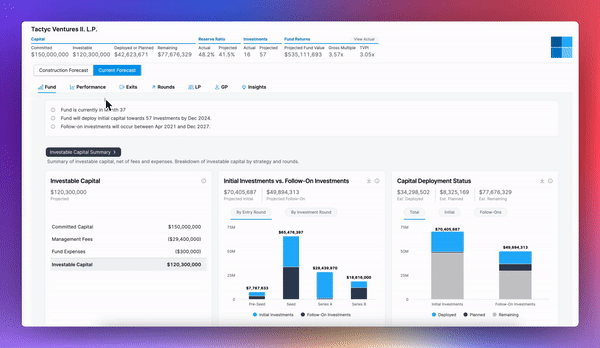Welcome to a new episode of the EUVC podcast, where we’ll cover recent news and movements in the European tech landscape with Dan Bowyer and Mads Jensen from SuperSeed.
Watch it here or add it to your episodes on Apple or Spotify 🎧 chapters for easy navigation available on the Spotify/Apple episode.
100% Automated, 100% Accurate Portfolio Intelligence
Private funds spend ~4 hrs on avg. analyzing every single PortCo update. That's 800 hrs per year for a fund with 50 startups in their portfolio (50 PortCos x 4 updates/year x 4 hrs)!
How about 0 hours?
Synaptic’s PortfolioIQ is your single source of truth for portfolio data, auto-updated from decks, excels, forms and emails. ZERO work for you or your PortCos.
✍️ Show Notes
U.S. Election Drama & Its Global Impact
The episode kicks off with a discussion on the upcoming U.S. election and its implications for tech, M&A, and the venture ecosystem. Dan and Mads dive into election stakes, predicting outcomes in key swing states, and the influence on global markets.
Geopolitical Impact: The outcome of the U.S. election is likely to shape global geopolitical dynamics, influencing U.S. involvement in Ukraine, the Middle East, and broader international relations. Mads highlights how these events could ripple into tech and finance, potentially impacting inflation and market stability.
Tech M&A Hopes: Under Trump, a more business-friendly stance could emerge, particularly regarding tech mergers. Policies easing restrictions on tech M&A would likely open more liquidity options for startups, fostering exit opportunities and enhancing deal flow in the venture space.
Election Drama and Market Uncertainty: With nearly half of U.S. voters casting ballots early, Dan and Mads comment on the close polling and potential for a highly contested result. They discuss how this uncertainty fuels volatility in global markets, keeping investors on edge and impacting VC sentiment in the U.S. and Europe.
Implications for Tech Policy: Beyond M&A, tech policies may face significant changes post-election. Depending on the administration, regulatory perspectives on Big Tech, immigration policies affecting tech talent, and spending on innovation and defense technology could all shift dramatically, impacting both the U.S. and European tech ecosystems.
The CHIPS Act & Strategic Concerns
Dan and Mads examine Noah Smith’s perspective on the CHIPS Act, a bipartisan initiative that’s bolstered U.S. semiconductor manufacturing, fueling job growth and competitiveness in a critical sector.
U.S. Semiconductor Leadership: The CHIPS Act has established the U.S. as a global leader in semiconductor production, driven by streamlined regulations and robust federal funding. This support has attracted significant private investment, multiplying the initial government outlay and ensuring U.S. dominance in semiconductor technology.
Economic & Strategic Impact: With over $280 billion in funding, including $52 billion for semiconductor research and manufacturing incentives, the CHIPS Act aims to strengthen the domestic supply chain. The long-term impact extends beyond tech, affecting sectors like defense, automotive, and consumer electronics, while creating thousands of high-skilled jobs across the U.S.
Europe’s Efforts to Compete: Europe’s CHIP Act seeks to emulate the U.S. success by allocating €11 billion for semiconductor projects, aiming to drive private investment and reduce dependency on non-European suppliers. However, Europe faces challenges, including slower regulatory processes and limited central funding, which hamper its ability to keep pace.
Collaborative Initiatives & Potential Gaps: While U.S. semiconductor initiatives have accelerated due to federal coordination, Europe’s approach relies on individual nations to fund and execute projects, often leading to delays. Dan and Mads suggest that a unified European strategy with faster approval processes and greater cross-country support will be essential if Europe wants to close the gap with the U.S..
Warren Buffett’s Strategic Sell-Off: Cashing Up for Future Opportunities
Warren Buffett has been making headlines with Berkshire Hathaway’s substantial sales, especially in Apple, resulting in a record $325 billion in cash reserves. The timing and motivations are multifaceted:
Market Valuation Concerns: Buffett is cautious about current high stock valuations, making it challenging to find value-driven investments. Selling now allows Berkshire to wait for better opportunities if markets correct.
Tax Strategy: With the possibility of future tax increases, Buffett's recent sales capitalize on the current corporate tax rate of 21%. Selling Apple stock, in particular, could result in a tax bill of $20 billion but offers tax advantages at today’s rates.
Portfolio Balance: Apple’s significant position (nearly 50% of Berkshire's portfolio) presented a concentration risk. This sell-off helps diversify holdings and balance the portfolio’s risk exposure.
Preparedness for Economic Downturns: By bolstering cash reserves, Berkshire is positioned to deploy capital if an economic downturn or market volatility creates value opportunities.
Buffett’s conservative and strategic approach suggests a readiness to invest in new opportunities while mitigating current risks, echoing his long-held value-focused investing principles.
Starmer’s Vision for Reform: Promises and Progress
Labour leader Keir Starmer has outlined ambitious reform plans for the UK, yet many question where tangible actions meet the rhetoric. The discussion covers the expectations and gaps in his administration’s approach:
A Push for Stability First: Starmer's emphasis on stability over immediate investment aims to repair structural issues, like filling the fiscal gap and addressing NHS deficits, before making significant new investments. While this resonates with some, others find it lacks the urgency needed for immediate economic stimulation.
Investment Frameworks & Private Sector Frustration: The government’s approach to major projects, like the third runway at Heathrow, is a litmus test of its commitment to attracting private capital. There’s a pressing need for regulatory clarity and expedited approvals to reassure investors. As it stands, the government’s slow movement has left investors skeptical about the UK’s readiness to “go back to building and growing”.
Labour’s Connection to Business Realities: Starmer’s administration is criticized for lacking direct business experience among key decision-makers, which affects their understanding of wealth creation and economic growth dynamics. Without this, policies risk being overly bureaucratic or distant from the needs of the private sector.
Will big tech enjoy all the gains from the AI boom?
With AI continuing to reshape industries, the conversation centers around whether big tech companies will consolidate their grip on AI-driven gains, or if there’s room for broader participation.
AI Boom and Market Dominance: Since OpenAI’s ChatGPT launched in late 2022, AI has propelled trillions in market cap for tech giants. Companies like Microsoft, Google, and Meta are poised to capitalize on their scale, deep resources, and proprietary models, making it challenging for new entrants to compete.
OpenAI’s Competitive Edge: OpenAI's rapid iteration and product quality—backed by Microsoft—are setting a high bar. This progress has spurred companies like Google to revisit and reinforce their own AI strategies, as competition heats up across the board.
Europe’s Role in AI and Semiconductors: The discussion highlights that for Europe to participate meaningfully in the AI boom, investments in semiconductor manufacturing are critical. Existing players like ARM and ASML offer a base, but more robust funding and policy support are needed to support Europe’s tech independence and prevent over-reliance on big U.S. players
Balderton Capital’s Report on Founder Mental Health: Burnout on the Rise
Balderton Capital’s latest founder wellbeing survey sheds light on the growing mental health challenges facing startup founders, with burnout rates escalating across the ecosystem.
Burnout as a Major Issue: The survey reveals that over two-thirds of founders now identify burnout from stress as a significant issue, marking an increase from 62% last year. The findings underscore the intense pressures of the startup journey, exacerbated by financial stress, high expectations, and an uncertain market.
Factors Driving Founder Stress: Financial uncertainty is one of the leading stressors, with 42% of founders attributing burnout to financial strain amid down rounds and capital constraints. The mental toll appears even more pronounced for older founders, who tend to face additional family and financial responsibilities.
VC’s Role in Supporting Founders: The report raises questions about the responsibility of VCs to support founder wellbeing. Some VCs are exploring new ways to alleviate stress beyond capital, such as offering childcare support, coaching, and mental resilience programs. Balderton and others are considering how they can better balance the high-stakes nature of venture with empathy for founders’ mental health.
Tactyc is the leading forecasting and scenario-planning software for venture capital funds, combining portfolio construction, portfolio management, forecasting, and reporting into a unified platform.

🤗 Join the EUVC Community
Looking for niche, high-quality experiences that prioritize depth over breadth? Consider joining our community focused on delivering content tailored to the experienced VC. Here’s what you can look forward to as a member:
Exclusive Access & Discounts: Priority access to masterclasses with leading GPs & LPs, available on a first-come, first-served basis.
On-Demand Content: A platform with sessions you can access anytime, anywhere complete with presentations, templates and other resources.
Interactive AMAs: Engage directly with top GPs and LPs in exclusive small group sessions — entirely free for community members.

🧠 Upcoming EUVC masterclasses
Advanced small-group sessions that take you from good to great. Lectured by leading GPs, LPs & Experts.
✍🏻 EUVC Masterclass | Marketing & VC Fund Narrative
Your brand is everything. It’s what sets you apart, helps you win the best deals, attract LPs, and ultimately drive your growth. For emerging fund managers, building a credible brand and establishing the right marketing foundations early on are game-changers. Yet, many don’t know where to begin.
Your fund’s narrative is what makes the difference between an LP glancing at your deck or deciding they’re ready to write a check. It’s your brand that makes LPs feel confident they’re partnering with someone who knows how to make magic happen.
We’re planning a masterclass on building strong marketing foundations with a top industry leader. If enough people show interest, we’ll make it happen.
✍🏻 EUVC Masterclass | Benchmarketing for GPs & LPs
Join us for an in-depth session on VC Fund Terms & KPIs: Mastering Metrics for Fund Success. This workshop will focus on the key performance indicators (KPIs) that drive VC fund performance and the critical timing for measuring these metrics. You’ll gain insights into what matters most to Limited Partners (LPs) and what General Partners (GPs) should focus on internally for effective fund management.
The session will also cover how to set up a comprehensive dashboard, including portfolio tracking, to streamline your reporting and ensure your fund’s success.
Special offer: Join the EUVC Community for 25€ per month and get 100€ off while enjoying access to on-demand masterclasses, tools & templates and monthly AMAs with leading GPs, LPs & experts.
🏔️ EUVC Nordic Getaway on June 5 - 8, 2025

🗓️ The VC Conferences You Can’t Miss
There are some events that just have to be on the calendar. Here’s our list, hit us up if you’re going, we’d love to meet!
GoWest | 📆 28 - 30 January 2025 | 🌍 Gothenburg, Sweden
GITEX Europe 2025 | 📆 23 - 25 May 2025 | 🌍 Berlin, Germany














